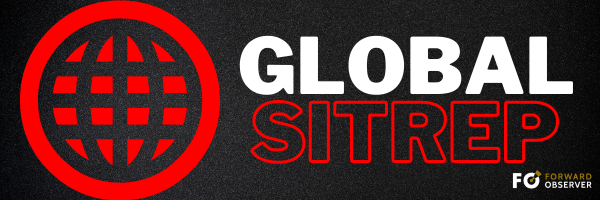Good morning, and welcome to the Global Situation Report for Thursday, 29 February 2024.
- USAF: CHINA SPACE WEAPONS TARGET COMMS, BANKING, DELIVERY: A recent U.S. Air Force University report on China’s space capabilities pointed out that China views space as a more flexible warfare area, would likely target non-traditional assets such as banking, and is likely to conduct a first strike while claiming it is defensive.
- Unconventional targets traveling on space-based mediums include banking, credit card transactions, entertainment, ride-hailing, and delivery services.
- “‘PRC sources describe [active defense] as having a strong offensive component that includes preemption, especially in situations involving PRC perceptions of its sovereignty and territorial integrity. According to the 2020 SMS, in these situations, the PRC ‘has the right to use military measures at any time,’” the report says.
- Director General of China’s Foreign Affairs Arms Control Department, Sun Xiabo, called for all nuclear-armed nations to establish a “No First Use” Treaty and begin nuclear disarmament. The USAF report cites Chinese manuals that say No First Use can only be effective if anti-satellite weapons cannot provoke a nuclear attack.
Why It Matters: China is likely trying to handicap one of their main deterrents to attacking U.S. space-based assets with the NFU and disarmament talk. Degrading quality of life factors such as delivery services, credit card transactions, and entertainment is classic Chinese Gray Zone Warfare as it would create fear, uncertainty, doubt, and frustrations in the civilian population. This is likely to be used months ahead of any potential action on Taiwan if China thinks the U.S. would attempt to prevent reunification. The long lead time would allow the effects to metastasize into civilians and service members preparing for war. – J.V.
- CHINA TROUBLE WITH SECRET KEEPING: The National Administration of State Secrets (NASS) announced that China was having “unprecedented risks and challenges” in keeping state secrets.
- Chinese government authorities are warning civilian state-owned enterprises against conducting work on unsecured networks such as WeChat.
- China’s military newspaper urged service members to be on high alert that they could become targets of adversary intelligence agencies.
Why It Matters: This is a sharp deviation from China’s normally tight-lipped policy about espionage issues. The NASS does not define if these are insider threats, cyber, or leakage. Specifically addresses leakage via WeChat. WeChat may pose a significant threat but would not be unprecedented. Thus, we are likely seeing China respond to cyber security threats from the West. This is a key indicator of an incoming war. – J.V.
- SCO DEFENSE MINISTERS MEETING SIGNALS POTENTIAL TROUBLE: Defense officials from countries of the Shanghai Cooperation Organization (SCO) held a preparatory meeting this week ahead of a full meeting in April.
- China founded the SCO in 2001 with other Central Asian countries and has since grown to include Eurasian powers like India and Iran, as well as numerous partners throughout Asia and the Middle East.
Why It Matters: The SCO Defense Ministers meeting is held annually, so it’s unlikely to be in direct response to any specific anticipated event. Topics this year will likely include escalation in the Israel-Gaza war (Egypt and Turkey are SCO partners but not members), the Russia-Ukraine war, and the potential involvement of the pro-Russian Transnistria region of Moldova (Moldova is an SCO partner but not a member), or the Armenia-Azerbaijan border conflict (both countries are SCO partners and Armenia tentatively remains a member of Russia’s Collective Security Treaty Organization – for now). – M.S.
- INDIA, GERMANY TO HOLD JOINT NAVAL EXERCISES: India and Germany agreed on a bilateral strategic partnership to boost defense cooperation, which includes joint military exercises in the Indo-Pacific.
Why It Matters: India’s strategic cooperation pact with Germany follows one signed with the United States last year. We have extensively covered India’s aspirations to become a regional power. This is likely their latest move toward that end. There is an additional piece to this: Germany is likely using this as another step to counter China. – J.V.
THAT’S A WRAP: This does it for today’s edition. Thank you for reading. If you know folks who would also like to receive this email, would you please forward it to them? We appreciate you spreading the word. – M.S.

